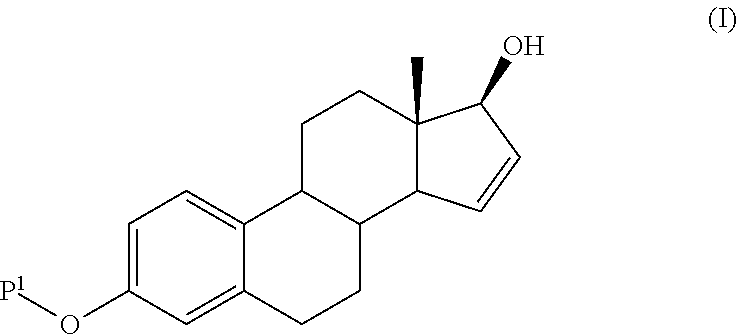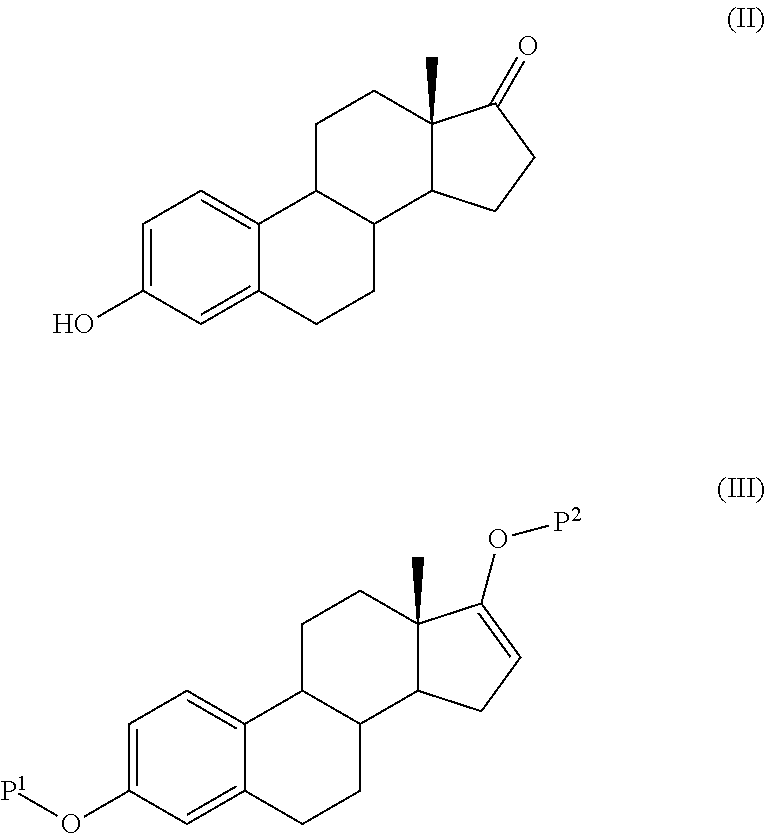Process for the production of estetrol intermediates
a technology of estetrol intermediates and estetrol, which is applied in the field of estetrol intermediate production process, can solve the problems of two-step protection/deprotection of the 17-keto function, the protection of the 3-oh function with a benzyl, etc., and achieves the effect of reducing cost and high yield
- Summary
- Abstract
- Description
- Claims
- Application Information
AI Technical Summary
Benefits of technology
Problems solved by technology
Method used
Image
Examples
example 1
Preparation of a Compound of Formula (I) Wherein P1 is Acetyl According to an Embodiment of the Invention
Step 1: Estra-1,3,5(10),16-tetraene-3,17-diol,3,17-diacetate
[0089]100 g of 3-hydroxy-estra-1,3,5(10)-trien-17-one (0.370 mole) was poured in 500 ml of isopropenyl acetate and 10 g of para-toluene-sulfonic acid. The mixture was refluxed. Acetone and isopropenyl acetate was continuously distilled off until the temperature reached 98° C. Then the mixture was cooled to 0° C. and K2CO3 was added.
[0090]After one hour at 0° C. the mixture was filtered, the resulting solution was concentrated and diisopropyl ether added. The precipitate was collected by filtration and dried. It weighted 111.5 g (yield: 85%)
[0091]1HNMR (CDCl3) δ 0.90 (s, 3H, CH3 at C-18), 1.30-1.50 (m, 11H), 2.20 (s, 3H, CH3 acetate), 2.30 (s, 3H, CH3 acetate), 2.30-2.50 (m, 2H), 5.54 (broad s, 1H)), 6.80 (broad s, 1H, H4), 6.82 (dd, 1H, H2), 7.27 (d, 1H, H1) mp=148.3° C.
Step 2: 3-acetoxy-estra-1,3,5(10),15-tetraen-17-one...
example 2
Preparation of a Compound of Formula (I) Wherein P1 is t-Butyldimethylsilyl According to an Embodiment of the Invention
Step 1: 3,17-di-t-butyldimethylsiloxy-estra-1,3,5(10)-16-tetraene-17-ol
[0096]To a solution of estrone (50 g, 0.185 mole) and 2,6-lutidine (62 g, 0.58 mole) in dichloromethane 400 ml was added drop wise t-butyl-dimethylsilyl-triflate (102.6 g, 0.39 mole). The solution was stirred at room temperature for 6 hours. Water (300 ml) was added and the organic layer was washed with a diluted solution of sodium carbonate. The dichloromethane solution was partially evaporated and ethyl acetate was added. Diisopropyl ether was added to this solution. The mixture was stirred for 2 hours at 0° C. The precipitate was collected by filtration and dried. 83 g of the title compound were obtained (90% yield).
[0097]1HNMR (CDCl3) δ 0.20 (s, 12H, (CH3)2—Si—), 0.90 (s, 3H, CH3 at C-18), 0.95 (s, 9H, (CH3)3—C—Si—), 1.00 (s, 9H, (CH3)3—C—Si—), 1.20-2.40 (m, 11H), 2.75-2.95 (m, 2H), 4.48 (m, ...
example 3
Preparation of a Compound of Formula (I) Wherein P1 is t-Butyldimethylsilyl According to an Embodiment of the Invention
Step 1: 3-t-butyldimethylsiloxy-estra-1,3,5(10)-triene-17-one
[0103]To a solution of estrone (100 g, 0.37 mole) in 400 ml of dichloromethane, imidazole (50.36 g, 0.74 mole) and t-butyl-dimethylsilyl chloride (61.3 g, 0.41 mole) were added The solution was stirred at room temperature for 24 hours. Then water (200 ml) was added. The organic layer was partially evaporated and diisopropyl ether added. The white solid formed was collected by filtration and dried. It weighted 135.2 g, yield 95%, mp 172° C.
[0104]1HNMR (CDCl3) δ 0.20 (s, 6H, (CH3)2—Si—), 0.90 (s, 3H, CH3 at C-18), 1.00 (s, 9H, (CH3)3—C—Si—), 1.20-2.60 (m, 13H), 2.75-2.95 (m, 2H), 5.65-5.75 (m, 1H), 6.58 (broad s, 1H, H4), 6.63 (dd, 1H, H2), 7.12 (d, 1H, H1) mp: 171.6° C.
Step 2: 3-t-butyldimethylsiloxy-estra-1,3,5(10)-16-tetraene-17-acetate
[0105]3-t-butyldimethylsiloxy-estra-1,3,5(10)-triene-17-one 135 g (0.3...
PUM
| Property | Measurement | Unit |
|---|---|---|
| temperatures | aaaaa | aaaaa |
| temperatures | aaaaa | aaaaa |
| temperature | aaaaa | aaaaa |
Abstract
Description
Claims
Application Information
 Login to View More
Login to View More - R&D
- Intellectual Property
- Life Sciences
- Materials
- Tech Scout
- Unparalleled Data Quality
- Higher Quality Content
- 60% Fewer Hallucinations
Browse by: Latest US Patents, China's latest patents, Technical Efficacy Thesaurus, Application Domain, Technology Topic, Popular Technical Reports.
© 2025 PatSnap. All rights reserved.Legal|Privacy policy|Modern Slavery Act Transparency Statement|Sitemap|About US| Contact US: help@patsnap.com



